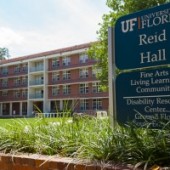
In order to state their commitment to sustainability, colleges and universities across the United States are signing environmental charters which emphasize the importance of incorporating environmental issues into education, research, operations, and outreach. As a signatory of several charters, the University of Florida (UF) has taken a particular interest in greening their student housing and has made considerable progress in retrofitting a housing stock over 100 years old. However, despite the implementation of sustainable practices throughout their residence buildings the university has continued to identify areas needing further improvement. As participants in the U.S. Green Building Council’s (USGBC) Research to Practice (R2P2) program, which aims to engage the educational community in a variety of on-campus research, a team of UF students and faculty utilized the opportunity to investigate obstacles faced in enhancing student housing performance. This case study reports on the pedagogy used by this team to assess the efficacy of applicable sustainable strategies and the environmentally significant behaviors of residents within three residence halls. This pedagogy aimed to first, involve students in project-based learning (PBL); and second, to provide a service to the university by contributing to its efforts to green the campus. Findings of this study illustrated a number of methods for improving building performance. Additionally, as pedagogy, PBL was found in this study to set the stage for acquisition of Gestaltungskompetenz—the organizational, participatory, collaborative, interdisciplinary, and reflection competencies necessary for sustainable development. However, while these findings offer great promise for improving sustainable practices and education, more focused research is needed to explore the challenges and opportunities of their application. Therefore, this study is an invitation to further our exploratory research and continue the discovery of applications for the PBL model in sustainability education.
Continue Reading